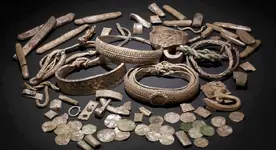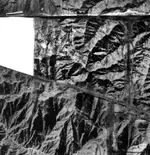You are using an out of date browser. It may not display this or other websites correctly.
You should upgrade or use an alternative browser.
You should upgrade or use an alternative browser.
Misc data and adventures of a Tayopa treasure hunter
- Thread starter Real de Tayopa Tropical Tramp
- Start date
KANACKI
Bronze Member
- Joined
- Mar 1, 2015
- Messages
- 1,445
- Reaction score
- 5,940
- Golden Thread
- 0
- Primary Interest:
- All Treasure Hunting
Hello All again
2015 was good year for treasure hunters.
In 2015 in place called Wallington James Mather had spend a crappy day detecting pull tabs and shot gun cartridges when just about to give up he had another go. And voila discovered 9th century treasure hoard dating back to the time of Alfred the great.
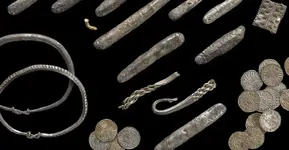
The Ashmolean Museum paid nearly 1.8 million USD for hoard.
And to think he had a crappy day to start? Well the later in day went from crappy to brilliant. The hoard was thought to have been buried in the 870 AD during the battle of Edington when Alfred the great was fighting the Vikings. Who ever buried most likely was hacked to death in battle.
Kanacki
2015 was good year for treasure hunters.
In 2015 in place called Wallington James Mather had spend a crappy day detecting pull tabs and shot gun cartridges when just about to give up he had another go. And voila discovered 9th century treasure hoard dating back to the time of Alfred the great.

The Ashmolean Museum paid nearly 1.8 million USD for hoard.
And to think he had a crappy day to start? Well the later in day went from crappy to brilliant. The hoard was thought to have been buried in the 870 AD during the battle of Edington when Alfred the great was fighting the Vikings. Who ever buried most likely was hacked to death in battle.
Kanacki
KANACKI
Bronze Member
- Joined
- Mar 1, 2015
- Messages
- 1,445
- Reaction score
- 5,940
- Golden Thread
- 0
- Primary Interest:
- All Treasure Hunting
Hello Again
In August 2015 treasure hunter Walter Hanks found 1000 viking coins found buried at place called Llandwrog in North Wales.
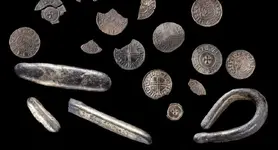
The hoard was deliberate burial site of treasure. Value of hoard was estimated 1 million USD. The coins was dated between 1020-1030 AD which are now almost 1000 years old.
Kanacki
In August 2015 treasure hunter Walter Hanks found 1000 viking coins found buried at place called Llandwrog in North Wales.

The hoard was deliberate burial site of treasure. Value of hoard was estimated 1 million USD. The coins was dated between 1020-1030 AD which are now almost 1000 years old.
Kanacki
KANACKI
Bronze Member
- Joined
- Mar 1, 2015
- Messages
- 1,445
- Reaction score
- 5,940
- Golden Thread
- 0
- Primary Interest:
- All Treasure Hunting
Two Cousin Martin and Kevin Elliott in 1999 found 9000 silver Denari Roman coins worth about 440 thousand USD. Near Glastonbury near Somerset.
The pair found the hoard 30 cm under the floor of a ruined Roman villa.
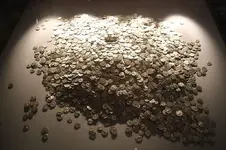
It was the first recorded ever discovery of treasure being buried inside a roman building on English soil.
Sadly so many Roman coins are being recovered by metal detectorist the value of coins are coming down.However 440 grand is still not a bad days pay.
Kanacki
The pair found the hoard 30 cm under the floor of a ruined Roman villa.

It was the first recorded ever discovery of treasure being buried inside a roman building on English soil.
Sadly so many Roman coins are being recovered by metal detectorist the value of coins are coming down.However 440 grand is still not a bad days pay.
Kanacki
KANACKI
Bronze Member
- Joined
- Mar 1, 2015
- Messages
- 1,445
- Reaction score
- 5,940
- Golden Thread
- 0
- Primary Interest:
- All Treasure Hunting
Hello All
More coffee?
In July 2012 A pot of gold from the Crusades worth up to $500,000 USD has been found buried in an ancient Roman fortress in Israel.The coins were buried by Christian soldiers of the order of the Knights Hospitalier as the Crusaders faced an unstoppable attack by a huge Muslim army.
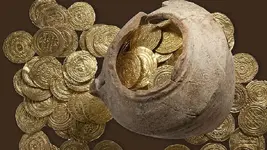
The knights were annihilated in April 1265.The coins - worth a fortune even in 1265 when they were thought to have been buried - were deliberately hidden inside a broken jug to prevent them being discovered.
The fortress was destroyed in April 1265 by forces of Mamluks who overwhelmed the Crusaders - and the treasure only survived due to the quick thinking of one of the defenders. But in 2012 a clean out of sand filled ancient pot gave the discovery of a life time?
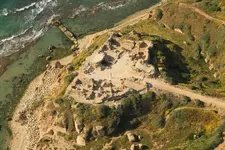
Of course these are discoveries that get publicity there are others of course due to circumstances its best to remain quiet.
Some discoveries it better to keep ones mouth shut.
Coffee amigos?
Kanacki
.
More coffee?
In July 2012 A pot of gold from the Crusades worth up to $500,000 USD has been found buried in an ancient Roman fortress in Israel.The coins were buried by Christian soldiers of the order of the Knights Hospitalier as the Crusaders faced an unstoppable attack by a huge Muslim army.

The knights were annihilated in April 1265.The coins - worth a fortune even in 1265 when they were thought to have been buried - were deliberately hidden inside a broken jug to prevent them being discovered.
The fortress was destroyed in April 1265 by forces of Mamluks who overwhelmed the Crusaders - and the treasure only survived due to the quick thinking of one of the defenders. But in 2012 a clean out of sand filled ancient pot gave the discovery of a life time?

Of course these are discoveries that get publicity there are others of course due to circumstances its best to remain quiet.
Some discoveries it better to keep ones mouth shut.
Coffee amigos?
Kanacki
.
Last edited:
Real of Tayopa
Bronze Member
KANACKI
Bronze Member
- Joined
- Mar 1, 2015
- Messages
- 1,445
- Reaction score
- 5,940
- Golden Thread
- 0
- Primary Interest:
- All Treasure Hunting
Hello All
In 2016 a student metal called Tom Lucking out detecting a field.
The grave of the Norfolk woman, who probably had aristocratic or royal connections, was found by Tom Lucking, then a landscape history student at the University of East Anglia. He has since graduated with a first and found work as an archaeologist. His student loan debt repayments will be made considerably easier by the 192 thousand USD valuation recently agreed at the British Museum for his treasure, which will be shared with the landowner.
Lucking was detecting on a ploughed field at Winfarthing, a site with no record of any Anglo-Saxon settlement. He first found a bronze bowl, which he then realised lay at the feet of a skeleton. He stopped digging and called in the county archaeology unit.
View attachment 1690638
A glorious jewel made from hundreds of tiny pieces of garnet set in gold to form geometric and animal shapes lay for 1,400 years on the breast of an unknown woman until her Norfolk grave was rediscovered by a first-year university student. The item was among a record number of treasure finds reported by the British Museum in the year 2016.
The pendant and other jewels and coins buried with the woman were among the spectacular discoveries mainly made by metal detectorists.
The coins, which showed no sign of wear, dated the burial to between AD650 and AD675. They were identical to one found in the grave of a woman near Ipswich, suggesting intriguing connections with the Frankish kingdom.
Most detectors are signed up to a code of practice that requires them to stop digging and call in the experts over significant discoveries. They must also report all finds.
Why the Brits are having so much success?
Because of the potable antiquities scheme?
The director of the British Museum, Hartwig Fischer, said the scheme was rare in Europe. “You let people follow their passion with a couple of rules you should abide by. Everyone does best.” The finder the land owner makes money and museums have these wonderful artifacts.
It is some thing many countries around the world should take notice of amigos.
Kanacki
In 2016 a student metal called Tom Lucking out detecting a field.
The grave of the Norfolk woman, who probably had aristocratic or royal connections, was found by Tom Lucking, then a landscape history student at the University of East Anglia. He has since graduated with a first and found work as an archaeologist. His student loan debt repayments will be made considerably easier by the 192 thousand USD valuation recently agreed at the British Museum for his treasure, which will be shared with the landowner.
Lucking was detecting on a ploughed field at Winfarthing, a site with no record of any Anglo-Saxon settlement. He first found a bronze bowl, which he then realised lay at the feet of a skeleton. He stopped digging and called in the county archaeology unit.
View attachment 1690638
A glorious jewel made from hundreds of tiny pieces of garnet set in gold to form geometric and animal shapes lay for 1,400 years on the breast of an unknown woman until her Norfolk grave was rediscovered by a first-year university student. The item was among a record number of treasure finds reported by the British Museum in the year 2016.
The pendant and other jewels and coins buried with the woman were among the spectacular discoveries mainly made by metal detectorists.
The coins, which showed no sign of wear, dated the burial to between AD650 and AD675. They were identical to one found in the grave of a woman near Ipswich, suggesting intriguing connections with the Frankish kingdom.
Most detectors are signed up to a code of practice that requires them to stop digging and call in the experts over significant discoveries. They must also report all finds.
Why the Brits are having so much success?
Because of the potable antiquities scheme?
The director of the British Museum, Hartwig Fischer, said the scheme was rare in Europe. “You let people follow their passion with a couple of rules you should abide by. Everyone does best.” The finder the land owner makes money and museums have these wonderful artifacts.
It is some thing many countries around the world should take notice of amigos.
Kanacki
KANACKI
Bronze Member
- Joined
- Mar 1, 2015
- Messages
- 1,445
- Reaction score
- 5,940
- Golden Thread
- 0
- Primary Interest:
- All Treasure Hunting
Kanaci.mi amigo. this is the why and whereforView attachment 1690635 of the Tayopa I wont point out Tayopa out of spite to those ompanies that hsd aadGod as thier chief geologist, or so the "geologist" thought.
Hello Don Jose amigo.
Some treasure discoveries are not that simple as the past posts of mine. Some have more complex issues to deal with. Some treasures cannot be squirreled away in secret. Some treasures require complex negotiations with different stake holders with different and some time apposing agendas. I imagine your Tayopa project falls into that Category?
The trio has ongoing problems with one of their projects that require a long legal battle and negotiation over. Yet I say one as each project has its own set of unique problems. These days publicly there is no such thing as finders keepers. Turning illicit discoveries into liquid assets is not as easy as one imagines. Depending on the size and location treasure can be made to disappear.
Some times things are better thought to be lost than discovered. If you know what I mean?
Kanacki
PROSPECTORMIKEL
Silver Member
- Joined
- Mar 31, 2011
- Messages
- 2,624
- Reaction score
- 9,424
- Golden Thread
- 0
- Location
- N/W ARKANSAS
- Detector(s) used
- FISHER
- Primary Interest:
- All Treasure Hunting
Hello all again
In 2009 Hertfordshire England Terry Herbert while detecting farmland in Stafford shire discovered on of largest Anglo Saxon treasure hoards yet so discovered. Worth about 4.3 million USD
View attachment 1690595
The hoard contained a massive collection of sword hilt, silver and gold crosses dating back to 1500 years.
Not a bad payday for days metal detecting?
Kanacki
Kanacki, among the many hoards that you have listed, this one, I believe that I saw this one on TV , Discovery Channel.
The discovery didn’t stop
The farmer from his plowing.
I remember seeing them set up lights so the filming crew could get the night shift work.
I think that I remember the farmer avoided the pay streak.
I thought, what a nut to rush them.
He said that once they were done, he would still be a farmer [emoji68]*[emoji264]...
I am finding new information from photos that are ten years old in several. I wish that I could see them when I was standing there!
Coffee [emoji477]️ any one??
#/;0{>~
KANACKI
Bronze Member
- Joined
- Mar 1, 2015
- Messages
- 1,445
- Reaction score
- 5,940
- Golden Thread
- 0
- Primary Interest:
- All Treasure Hunting
Hello PM
I suspect the farmer was more concerned getting his crop in. Because regardless of treasure trove or not the farmer needs to pay his bills.The banks as we know is like having a contract with the devil? They want their payment on the nose by the due date.
Treasure trove usually takes 12 months to decide if there is anything of value and decide to buy items for the museum. The fact is over 84000 items get handed in most item are worthless in monetary aspect every year. However priceless in archaeological research to help understand dispersal patterns of trade goods from that relevant era.
There is clause in treasure trove law if you given permission by the landholder with no agreement in place to share the finds usually 50/50. Then the finder becomes sole beneficiary of treasure trove.
Most detectorst offer as carrot to get permission from the landholder usually state 50/50 in their agreement. 99% of time they only find junk metal. So it is easy to see why a farmer with more concerns getting his crop in would wave his 50% share in given permission.
Kanacki
I suspect the farmer was more concerned getting his crop in. Because regardless of treasure trove or not the farmer needs to pay his bills.The banks as we know is like having a contract with the devil? They want their payment on the nose by the due date.
Treasure trove usually takes 12 months to decide if there is anything of value and decide to buy items for the museum. The fact is over 84000 items get handed in most item are worthless in monetary aspect every year. However priceless in archaeological research to help understand dispersal patterns of trade goods from that relevant era.
There is clause in treasure trove law if you given permission by the landholder with no agreement in place to share the finds usually 50/50. Then the finder becomes sole beneficiary of treasure trove.
Most detectorst offer as carrot to get permission from the landholder usually state 50/50 in their agreement. 99% of time they only find junk metal. So it is easy to see why a farmer with more concerns getting his crop in would wave his 50% share in given permission.
Kanacki
Last edited:
KANACKI
Bronze Member
- Joined
- Mar 1, 2015
- Messages
- 1,445
- Reaction score
- 5,940
- Golden Thread
- 0
- Primary Interest:
- All Treasure Hunting
Hello All
Hardluck told me a funny story.
People perceive finding treasure is more like the treasure adventure moves? They have this amazing adventure defeat the baddy get the treasure and sail off with a girl into the sunset?
The reality is more like a TV series. Endless court room challenges and dramas. Self interest groups with nothing better to than cry cultural patrimony. Various parties all wanting a cut with lawyers circling around the finder like if he is carcass. And the girl has gone off with lawyers to diner leaving you the poor finder with the left overs.
Coffee?
Kanacki
Hardluck told me a funny story.
People perceive finding treasure is more like the treasure adventure moves? They have this amazing adventure defeat the baddy get the treasure and sail off with a girl into the sunset?
The reality is more like a TV series. Endless court room challenges and dramas. Self interest groups with nothing better to than cry cultural patrimony. Various parties all wanting a cut with lawyers circling around the finder like if he is carcass. And the girl has gone off with lawyers to diner leaving you the poor finder with the left overs.
Coffee?
Kanacki
Last edited:
Real of Tayopa
Bronze Member
Hi, in Mexico basically it is 50/50 on private land if you have permision , 100% to the landowner if you don't. Same for fed lands but it is tricky.even with permission.
KANACKI
Bronze Member
- Joined
- Mar 1, 2015
- Messages
- 1,445
- Reaction score
- 5,940
- Golden Thread
- 0
- Primary Interest:
- All Treasure Hunting
Hi, in Mexico basically it is 50/50 on private land if you have permision , 100% to the landowner if you don't. Same for fed lands but it is tricky.even with permission.
Hello Don Jose
Its same in many countries although each country has different interpretations of treasure trove laws. Some depend on the age of item etc.. In South America they do not give a dam about colonial relics. However if native get thee to scaffold. :-) Ironic as revisionists seem want write out their colonial past. The is real danger of revisionist history can be manipulated to suit the in favor agenda of the day.
That can flow onto policy making in regards to treasure trove laws.
If possible the less you have to do with bureaucrats the better?
For example in the process of stating in non incriminating terms the person or persons involved? Get my drift? :-)
There is certain "some one" who pulled fast one late last year. Masterminded in one country circumvented the laws in another. Purchased a property by proxy. Discovered treasure resold the property inflated the value of property in calculation of the treasure on the property. Then organised international monetary transactions through various accounts then divide shares among those involved.
No treasure laws was violated. No treasure was removed. Thus the discovery became the discretion of the new property owner. Who paid for the property that had treasure discounted enough for him to make a nice profit also. If he should chose to make the discovery public.
Thus the treasure trove law not allowing foreigners to benefit from treasure was technically circumvented. Not one bureaucrat was involved in fact none of them was even aware the deal had taken place. the entire transaction was done deal in two weeks, And a few locals involved was paid off.
Of course when a few locals became flush with cash inevitably some one will spill the beans. The local mayor got wind of matter and made an attempt to get a cut. Other wise he was going to make a big stink. However he got flown out to another country, fed booze and wild women then shunted off back to hole he crawled out from. left wondering with no proof because people who was in the know wasn't talking.
They was too busy counting their money. :-)
Kanacki
uglymailman
Bronze Member
Kanacki, I enjoyed your tale of the Texans and the Drumbeat. When my Dad went into the Navy in WW2, I don't think he'd ever even been on a row boat. His first three days aboard ship at sea, he was so sick he "couldn't hit his butt with both hands at the same time". A kind cook gave him crackers and apple slices that he was able to keep down. He was sick until his ship made contact with a German U Boat and the General Quarters alarm sounded. His Battle station was at a hatch to pass Hedgehogs (a projectile kind of like a mortar round, they weighed like 70 pounds) up to the deck. He was passing them, one in each hand as fast as he could. After that he wasn't sick another day. That included a Typhoon on Christmas Day of 45' off the Aleutian Islands of Alaska.
Hope you and Mi Major keep the tales coming. Good luck.
Hope you and Mi Major keep the tales coming. Good luck.
KANACKI
Bronze Member
- Joined
- Mar 1, 2015
- Messages
- 1,445
- Reaction score
- 5,940
- Golden Thread
- 0
- Primary Interest:
- All Treasure Hunting
Kanacki, I enjoyed your tale of the Texans and the Drumbeat. When my Dad went into the Navy in WW2, I don't think he'd ever even been on a row boat. His first three days aboard ship at sea, he was so sick he "couldn't hit his butt with both hands at the same time". A kind cook gave him crackers and apple slices that he was able to keep down. He was sick until his ship made contact with a German U Boat and the General Quarters alarm sounded. His Battle station was at a hatch to pass Hedgehogs (a projectile kind of like a mortar round, they weighed like 70 pounds) up to the deck. He was passing them, one in each hand as fast as he could. After that he wasn't sick another day. That included a Typhoon on Christmas Day of 45' off the Aleutian Islands of Alaska.
Hope you and Mi Major keep the tales coming. Good luck.
Hello uglymailman
Its my pleasure sharing some yarns.
My hats off to your dad and in fact anyone who served in the big red one in all parts of the world.
Kanacki
Real of Tayopa
Bronze Member
oh the tales I could tell you about interference and politicians sigh and likewise protecting the patrimony, but is to my best interests to keep quiet.
PROSPECTORMIKEL
Silver Member
- Joined
- Mar 31, 2011
- Messages
- 2,624
- Reaction score
- 9,424
- Golden Thread
- 0
- Location
- N/W ARKANSAS
- Detector(s) used
- FISHER
- Primary Interest:
- All Treasure Hunting
Hello Don Jose
Its same in many countries although each country has different interpretations of treasure trove laws. Some depend on the age of item etc.. In South America they do not give a dam about colonial relics. However if native get thee to scaffold. :-) Ironic as revisionists seem want write out their colonial past. The is real danger of revisionist history can be manipulated to suit the in favor agenda of the day.
That can flow onto policy making in regards to treasure trove laws.
If possible the less you have to do with bureaucrats the better?
For example in the process of stating in non incriminating terms the person or persons involved? Get my drift? :-)
There is certain "some one" who pulled fast one late last year. Masterminded in one country circumvented the laws in another. Purchased a property by proxy. Discovered treasure resold the property inflated the value of property in calculation of the treasure on the property. Then organised international monetary transactions through various accounts then divide shares among those involved.
No treasure laws was violated. No treasure was removed. Thus the discovery became the discretion of the new property owner. Who paid for the property that had treasure discounted enough for him to make a nice profit also. If he should chose to make the discovery public.
Thus the treasure trove law not allowing foreigners to benefit from treasure was technically circumvented. Not one bureaucrat was involved in fact none of them was even aware the deal had taken place. the entire transaction was done deal in two weeks, And a few locals involved was paid off.
Of course when a few locals became flush with cash inevitably some one will spill the beans. The local mayor got wind of matter and made an attempt to get a cut. Other wise he was going to make a big stink. However he got flown out to another country, fed booze and wild women then shunted off back to hole he crawled out from. left wondering with no proof because people who was in the know wasn't talking.
They was too busy counting their money. :-)
Kanacki
Hi all.
I always make the same agreement with land owners for permission to hunt their property.
When I am done, I lay out all of my finds and he gets to pick up the one piece that he wants, then I do the same.
We repeat the process until it is all gone, or one of us has all the things that we want to keep.
That keeps it fair for all.
I have kept my agreement forms with names and phone numbers, so that I can call them back for a reference when approaching a new land owner.
We both sign it. Where the landowners sign, their is a statement that I have their permission to be there, and it goes on to say that if a neighbor has concerns that they can call them to confirm that I am there with permission.
As for public land.... That’s a bit different.
I have actually been able to stake a claim on the edge of a state park, for the GPAA! With one restriction, that we don’t undermine a trail along the edge of the creek. The trail runs from a parking area to a cave.
I had to call five different people to get it done but it was worth it.
It was a civil war camp and there is still plenty to dig for.
A year or so afterwards, I was testing my design for a self contained hand powered suction dredge.
I was standing in about a foot deep edge of the water and trying to check it out as to what it would capture.
I had tossed out three of my teaching nugglets that are pieces of 22 bullets that were shot into a sandy bank and recovered and painted with “ metallic gold “ paint.
They look real and will find their way to the bottom of a gold pan!
Kids that I have taught to pan , that see them in the pan are hooked for life.
Back to the story...
while I was testing the dredge, a Young man in uniform came down to where I was and said “ You know that you cannot keep anything that you find there, right?
I finished drawing up my three nugglets , turned around and opened the dredge, collected my my pieces and said “actually, yes I can, I have a claim and you need to read the mining laws of 1849.”
I dumped the rest of the heavy junk back in the creek, as I walked past him while still scratching his head about my answer and dropped one of my pretty little golden nugglets in his hand and the other two, into my pocket!
I didn’t tell him that they were fake.
I sometimes wonder what he did with it!!!!
#/;0{>~
doc-d
Bronze Member
- Joined
- May 19, 2013
- Messages
- 1,639
- Reaction score
- 2,562
- Golden Thread
- 0
- Location
- Pacific Northwest
- Primary Interest:
- All Treasure Hunting
Truly the journey that is reward enough. Time outdoors, meeting new people, new experiences and sometimes new cultures in strange lands.
KANACKI
Bronze Member
- Joined
- Mar 1, 2015
- Messages
- 1,445
- Reaction score
- 5,940
- Golden Thread
- 0
- Primary Interest:
- All Treasure Hunting
Hello All
Grab a coffee here is yarn for you.
All seasoned treasure hunters knows the old saying where there,s treasure evil is never far away.
A world class marine explorer, Bermudian Teddy Tucker is internationally considered one of the most preeminent in his field.
The son of architect Edward Tucker, Mr Tucker’s first job was at the Bermuda Aquarium which started his passion for the ocean. He has been exploring the ocean’s buried treasures since the late 1940’s.
In his decades long career he discovered over 100 historic shipwrecks in Bermuda waters, found numerous sunken treasures, was featured in international films and magazines and served as a consultant worldwide.
World renowned for his treasure hunting, Teddy Tucker has found numerous treasures including; gold bars, silver coins, swivel guns, ancient hand grenades, brass dividers, timing glasses, brass cylinders, bronze mortars, pewter plates, porringers, pottery cruets, and Carib Indian weapons.
The May 9, 1965 issue of an American newspaper [The Herald-Journal] quotes Mr. Tucker as saying he had made close to $500,000 from his finds to that date – which was over forty years ago.
His most famous find is considered one of the most valuable pieces of sunken treasure ever found. The emerald studded 22 karat gold Tucker Cross was discovered by Teddy Tucker in 1955. It is believed to have come from ‘San Pedro’, a Spanish galleon which was lost on the reefs in 1594. He sold it to the Government of Bermuda in 1959 saying “he wanted it to remain on the island forever.”

However that forever was short lived? Once again my friends remember the quote about treasure and evil?
In 1975, just before an official visit by Queen Elizabeth II to the Maritime Museum to view the treasure, it was discovered that somehow the Tucker Cross had been stolen and a replica left in its place.
Local lore says that due to the type of the theft, and by the cunning plan of using a replica to disguise the theft rather then "simply" just stealing it. The thief was most likely not a Bermudian, but rather an international art thief.
Despite an investigation which reputedly involved the Bermuda Police, FBI, Scotland Yard and Interpol the original has never been recovered, and the crime remains one of both Bermudas greatest unsolved mysteries.
No one to this day knows the where about of the original in which the value would be priceless.
pssss want to buy a cross? er just kidding. :-)
Coffee.
Kanacki
Grab a coffee here is yarn for you.
All seasoned treasure hunters knows the old saying where there,s treasure evil is never far away.
A world class marine explorer, Bermudian Teddy Tucker is internationally considered one of the most preeminent in his field.
The son of architect Edward Tucker, Mr Tucker’s first job was at the Bermuda Aquarium which started his passion for the ocean. He has been exploring the ocean’s buried treasures since the late 1940’s.
In his decades long career he discovered over 100 historic shipwrecks in Bermuda waters, found numerous sunken treasures, was featured in international films and magazines and served as a consultant worldwide.
World renowned for his treasure hunting, Teddy Tucker has found numerous treasures including; gold bars, silver coins, swivel guns, ancient hand grenades, brass dividers, timing glasses, brass cylinders, bronze mortars, pewter plates, porringers, pottery cruets, and Carib Indian weapons.
The May 9, 1965 issue of an American newspaper [The Herald-Journal] quotes Mr. Tucker as saying he had made close to $500,000 from his finds to that date – which was over forty years ago.
His most famous find is considered one of the most valuable pieces of sunken treasure ever found. The emerald studded 22 karat gold Tucker Cross was discovered by Teddy Tucker in 1955. It is believed to have come from ‘San Pedro’, a Spanish galleon which was lost on the reefs in 1594. He sold it to the Government of Bermuda in 1959 saying “he wanted it to remain on the island forever.”

However that forever was short lived? Once again my friends remember the quote about treasure and evil?
In 1975, just before an official visit by Queen Elizabeth II to the Maritime Museum to view the treasure, it was discovered that somehow the Tucker Cross had been stolen and a replica left in its place.
Local lore says that due to the type of the theft, and by the cunning plan of using a replica to disguise the theft rather then "simply" just stealing it. The thief was most likely not a Bermudian, but rather an international art thief.
Despite an investigation which reputedly involved the Bermuda Police, FBI, Scotland Yard and Interpol the original has never been recovered, and the crime remains one of both Bermudas greatest unsolved mysteries.
No one to this day knows the where about of the original in which the value would be priceless.
pssss want to buy a cross? er just kidding. :-)
Coffee.
Kanacki
Last edited:
KANACKI
Bronze Member
- Joined
- Mar 1, 2015
- Messages
- 1,445
- Reaction score
- 5,940
- Golden Thread
- 0
- Primary Interest:
- All Treasure Hunting
While we think of lost treasure being ancient.
In fact lost treasure is be created all the time. Even in our lifetime. The 20th century with the upheaval of two world wars and the great depression was powerful motives to hide money and gold. There is another motive to hide treasure from the proceeds of crime. While one would argue why would thief go to all trouble stealing some thing then just hide it?
It comes down to several reasons. One you suddenly appear to be cashed up and it is noticed by your people in street living around you. Can raise a red flag. Walking up to car dealers show room paying cash for an expensive car raises that flag too? And what if the item is famous and well know like a work of art or piece of famous jewelry etc...who will buy it or as they say in trade fence it? Not so easy! Especially with criminals because most of the time they already have records so its in their best interest to hide such valuables until they are able to convert it into cash. So you can see the motive to hide items until a buyer is found?
Yet some criminals have a multilayered life of crime and even if they have hidden some thing they might get arrested for some thing else and go to jail and though one circumstance after another being unable to return for their hidden stolen loot.
I have another yarn for you.
You know there are some criminals have brilliant cunning plans to steal loot but then post theft do incredibly stupid things to get themselves caught? The more involved the more chances one of criminal will slip up.
Coffee to be continued...
Kanacki
In fact lost treasure is be created all the time. Even in our lifetime. The 20th century with the upheaval of two world wars and the great depression was powerful motives to hide money and gold. There is another motive to hide treasure from the proceeds of crime. While one would argue why would thief go to all trouble stealing some thing then just hide it?
It comes down to several reasons. One you suddenly appear to be cashed up and it is noticed by your people in street living around you. Can raise a red flag. Walking up to car dealers show room paying cash for an expensive car raises that flag too? And what if the item is famous and well know like a work of art or piece of famous jewelry etc...who will buy it or as they say in trade fence it? Not so easy! Especially with criminals because most of the time they already have records so its in their best interest to hide such valuables until they are able to convert it into cash. So you can see the motive to hide items until a buyer is found?
Yet some criminals have a multilayered life of crime and even if they have hidden some thing they might get arrested for some thing else and go to jail and though one circumstance after another being unable to return for their hidden stolen loot.
I have another yarn for you.
You know there are some criminals have brilliant cunning plans to steal loot but then post theft do incredibly stupid things to get themselves caught? The more involved the more chances one of criminal will slip up.
Coffee to be continued...
Kanacki
Similar threads
Users who are viewing this thread
Total: 1 (members: 0, guests: 1)

